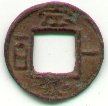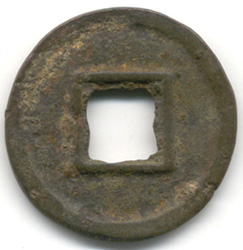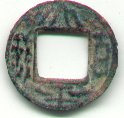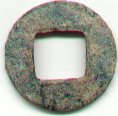
Three Kingdoms A.D. 220-280 Info

Three Kingdoms A.D. 220-280
Info
Kingdom of Wei (220-265). Wei uses Wu Zhu of
Han dynasty.
Peng Xinwei Page 124:
Wei coins include only Wu Zhus. After Cao Cao restored the
Wu Zhu,
we do not know if new coins were minted or if they merely continued to
use old ones. One would guess that not many of
the old Wu Zhus remained
in the capital region then. Nor was it impossible that renewed minting was
undertaken.
Wu Zhus minted then would have resembled Eastern Han
Wu Zhus. Those which began to be minted in the first year of the Tai He
period
(227 A.D.) of Emperor Ming
could have differed in size and weight, but there is now no way to distinguish
such Wu Zhus.
Kingdom of Shu Han(221-263).


Schjöth 206 Ding 556. Ding Ping Yi Bai.* (Value 100 zhu).


Ding 558. Zhi Bai. (Value 100 zhu).
Kingdom of Wu(229-280).


Ding 535. Da Quan Dang Qian. (Value 1000 zhu). 11,7 gr.


Schjöth 204 Ding 546. Tai Ping Bai Zhu. (Value 100 zhu).
I don't know the reason, but most catalogues name this coin Tai Ping Bai
Qian. It would seem logical that this coin was Tai Ping Bai Zhu since all coins
of this time were zhu coins. As you see below Peng Xinwei calls it Tai Ping Bai
Zhu* and this the name I use.
* Peng Xinwei Page
131:
The Ding Ping Yi Bai is the most difficult to explain of Chinese coins. Only
small ones exist.
The heaviest of them is only a little over l gram. Hence they would have been
minted later
than the Tai Ping Yi Bai Zhu and the Value-hundred. Probably they were minted in
the first year of
Shu-Han ruler Hou Zhu's Yan Xi period (238 A.D.) ...........................
In fact there is no plausible explanation for the two characters Ding Ping. All
we can affirm
is that these coins are contemporaneous with and from the same place as the
small Tai Ping
Yi Bai Zhu, because they have been found together. They are somewhat scarcer
than the
Value-hundred and Tai Ping Yi Bai Zhu. If they were minted by the Shu-Han
authorities,
they could only have been some sort of a commemorative coin or some sort of
special issue.